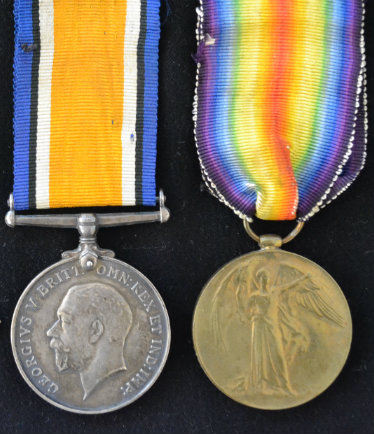Personal Details
Born in Over, Cheshire in 1879, the second son of Joseph and Sarah Viggor. Frank lodged at 8 Richmond Terrace, Station Road, Whitchurch before moving close by to Laurel Mount in Station Road. He was an ironmonger with a shop in Whitchurch.
Frank was wounded in action on 18th September 1918 when his battalion was shelled by British artillery which fell short. The battalion suffered 13 killed in this action with another 48 wounded. Interestingly most of the graves, including Frank Viggor's and one of the officers, were lost. The other officer Captain H L Allfrey was buried in a cemetery some 10 miles away, perhaps because his body was found and could be identified after the War. (Sources: Battalion War Diary and CWGC)
Military Details
Regiment : 10th (Service) Battalion The Buffs (East Kent Regiment)
Rank : Private
Service Number : G/24588
Killed in Action; France 21st September 1918 Age 29

The British War Medal (also known as 'Squeak') was a silver or bronze medal awarded to officers and men of the British and Imperial Forces who either entered a theatre of war or entered service overseas between 5th August 1914 and 11th November 1918 inclusive. This was later extended to services in Russia, Siberia and some other areas in 1919 and 1920. Approximately 6.5 million British War Medals were issued. Approximately 6.4 million of these were the silver versions of this medal. Around 110,000 of a bronze version were issued mainly to Chinese, Maltese and Indian Labour Corps. The front (obv or obverse) of the medal depicts the head of George V. The recipient's service number, rank, name and unit was impressed on the rim.
The Allied Victory Medal (also known as 'Wilfred') was issued by each of the allies. It was decided that each of the allies should each issue their own bronze victory medal with a similar design, similar equivalent wording and identical ribbon. The British medal was designed by W. McMillan. The front depicts a winged classical figure representing victory. Approximately 5.7 million victory medals were issued. Interestingly, eligibility for this medal was more restrictive and not everyone who received the British War Medal ('Squeak') also received the Victory Medal ('Wilfred'). However, in general, all recipients of 'Wilfred' also received 'Squeak' and all recipients of The 1914 Star or The 1914/1915 Star (also known as 'Pip') also received both 'Squeak' and 'Wilfred'. The recipient's service number, rank, name and unit was impressed on the rim.
Further Information
Report in the Whitchurch Herald 16th November 1918 relating to the death of Frank Viggor
"The sad news that Mr F Viggor, late of Messrs Tupling & Viggor Ironmongers of Whitchurch, has been killed in action in France was received last weekend with very sincere regrets by many personal friends in Whitchurch, and also customers of the firm, to whom he was courteous and obliging. The town has lost by his death a respected tradesman. The gallant soldier came to Whitchurch from Little Budworth, Tarporley, and joined Mr Tupling in the Ironmongery and Coal business in May 1909. He entered the Army in April 1917 in the transport section, later being passed for the infantry and was posted to the 10th Battalion East Kent Regiment. He trained in Edinburgh and afterwards served in the firing line in Egypt, Palestine and France. He was reported missing on September 21st, and has since been reported killed in action on that date. He leaves an elder brother and two sisters, his mother died whilst he was in Egypt."
Whitchurch Herald 16th November 1918
Taken from Forces War Records
If you can provide any further information on George Frank Viggor please get in touch by leaving a comment below, using our Contact Form or by calling in to Whitchurch Heritage Centre.
Information provided by Terry Evanson Whitchurch, Shropshire and Whitchurch Museum and Archives


